notes from the road
The Best Site on the Web? Finally, after years and years of exploring, I've found it. More than a travel site, notes from the road explores the beauty and uniqueness of place, in a new form of travel writing. Author and photographer Erik Gauger explores the world with his eyes, camera, and heart, and shows us a new way to experience travel. With a 40 pound large-format Toyo AX camera, a moleskin, and art supplies, Erik shows us incredible beauty, more than I have ever seen.
Erik explores several themes on notes from the road - a native history of Oregon, Travels with an Imaginary Fromagier (search for artisanal cheeses), Rise up Sweet Island (dramatically documenting environmental choices in the Bahamas), a Botanical History of the Antilles, and The Lost Sons of Afghanistan/a Museum for Kabul. He also explores, through photos and essays, the Desert Southwest, Pacific Northwest, the West Indies, Desert Mexico, the Iberian Peninsula, Great Plains, Sierra Range, the Isthmus, Great Basin, Atlantic Seaboard, and the Northern Seas. Each essay is rich in detail, humanity, and beauty - as well as the truth of travel, social justice, joy and life. Each time I visit notes from the road, I dive in, spending hours reading, looking at the magnificent photos, and thinking about life, travel, and the people we meet in our lives.
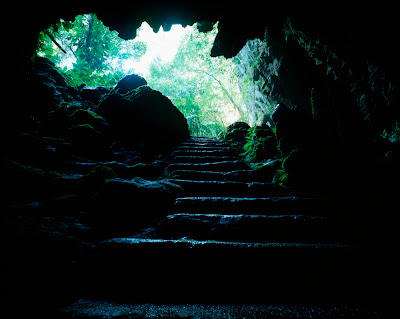
An ancient and dark cave in the Belize jungle was once used by Mayans
I was lucky enough to sit down and talk with Erik. The interview was both illuminating and inspiring. Here's what he had to say...
WE: Please tell us about your site, notes from the road...Where did the site evolve from?
EG: Ten years ago, I was just out of college, and I was living in Manhattan Beach, California. I couldn’t afford to go out with my friends on weekends – expensive dinners with lots of wine. I was also feeling the weight of work life. I worked hard in high school and college, and these long hours were my reward? Work weighed down on people. Everybody was getting fat. They stopped listening to music. The television was ominous for everyone. I thought this was all ridiculous, and I needed a way out.
One Friday evening, I just slipped out of town. I had just enough money for gas and food. I went east, I got lost, I kept driving. I ended up in some strange desert town, and when I opened the door to the town’s dusty bar, I entered a world I would never turn my back on. The next morning, I kept driving, and by the time I returned home, I was sunburned, bruised from hikes and scrambles. In that weekend, I spent a quarter of what I would spend on the dinners between long hours of watching television.
Monday morning, I wrote about my experience and emailed it out to a group of friends. A week later, I did the same. There was no plan to all of this, I was just enjoying myself.
By the end of that year, I had paid for a 4x5 large format camera and planned out an aggressive travel schedule for the year 2000: twenty four trips in a year, each on a budget under a hundred dollars. The website went up on January 1, 2000. I didn’t know how to design websites, or even write. I was still learning how to use my new camera.
I had no idea that within a few days of launching my travel blog, I would gain a loyal audience. Should I keep trying to entertain them? Would it be such a bad idea to just keep traveling?
So I had a decision to make. People wanted me to start monetize my website. But I already had my own idea of what Notes from the Road would be – my own personal education.
For a long time, I believed there was a special kind of person – a person who was intelligent, who pursued knowledge, knew art. They were painters, authors, teachers, doctors, inventors, explorers. They were the people who smiled at strangers and were curious about other places, loved to talk to people from far away. I wanted Notes from the Road to be a place for them – the few people who wouldn’t mind engaging an hour reading about someone else’s travels. I wanted to offend everybody else – I wanted Notes from the Road to be that kind of travel site; travel writing is supposed to be dark, to make people think, to even anger them a bit.
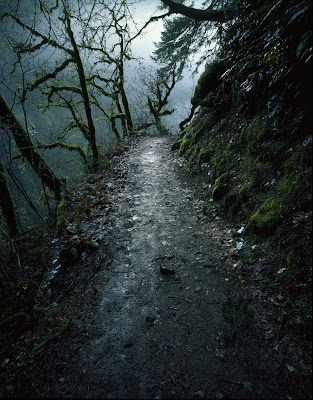
Columbia River Gorge, Oregon
WE: You write a lot about the negative aspects of development in the
Caribbean - can you please tell us more about that? How can we help?
EG: The Caribbean is Northern America’s next door neighbor. People forget how vast this region is; how much is out there. And how wonderful and diverse it is. The Caribbean connects so much of North America and South America; it is rich histories, wonderful people.
But the Caribbean is a greatly diminished place; a great jewel of our hemisphere is being lost, and quickly. So many of the coral reefs of the Caribbean are reduced to algae-slimed dead zones. The mangroves, so vital both to the sea and to the island’s themselves, are being bulldozed. People in their own countries are treated like second class citizens, as real estate and travel needs expand. As real estate in Miami dries up, build in the Caribbean!
Irresponsible development and the type of tourism that fuels that development is responsible for so much of the diminished state of the Caribbean. And it can, and has, literally sunk countries. Remember that tourism defines the Caribbean, and so the type of tourism we support determines the fate of the cultures and environments of these places.
I concentrate on one specific island in the West Indies – a seven mile island in the very north of the Bahamas. We have a hard time here in the states convincing people about threats of climate change, or coastal habitat loss, and so forth. We have a hard time convincing people of the power of scientific consensus. But imagine the Bahamas, where science is viewed with even more suspicion.
On Great Guana Cay, a developer from California began building a 180 slip marina, a golf course, and 500 units. Their plan is to terraform 2/5ths of the island into a California-style gated mega-development. The problem is that the scope of the project is so large, scientists predict it will destroy the coral reef in a matter of a few years. The reef is of international significance, as it is one of the few remaining healthy examples of elkhorn and staghorn reefs.
The developer hired a team from the biology department of the University of Miami to act as an environmental monitoring team. They, in their bright lab coats and nice benefits, have helped convince the Bahamas that this development will actually help the environment of the area. It’s a masterful public relations concept in an age where the term green development can still be used as deception, and where greenwashing has yet to be exposed.
The locals on the island, who are fighting tooth and nail to save their traditional indigenous community by demanding responsible development, look like dirty barefoot nuts next to the University of Miami scientists. And although all major marine conservation organizations support the locals’ position, it doesn’t matter – in the Bahamas, the developer has control over the message, and there is no suitable education to teach people how to distinguish between real science and demagogy.
The issue is going all the way to Privy Council in the commonwealth’s highest court – in London. So this story is far from over, and I am lucky to be the only one to have followed it from the beginning.
The Guana Cay story plays out everywhere around the Caribbean. I keep track of about 15 similar stories. But news agencies and newspapers don’t cover these stories. Environmental movements are all focused on global warming and big international issues. These stories could fall within the domain of professional travel writers, who grace Caribbean shores every day. These stories of conflict, which are created by the travel industry, are much more interesting, more colorful and more exciting than how delicious that margarita was. But the travel writing industry is tied too closely to advertising dollars, and travel writers tend not to have an education in environmental sciences, so the stories of the demise of the Caribbean will never get told.
WE: You are a traveler, and yet from your writings and photographs, travel quite differently than most tourists. What is your travel philosophy?
EG: Carl Sagan said it best when he said, “When you make the finding yourself - even if you’re the last person on Earth to see the light - you’ll never forget it.” I have never been asked this question, but I mention that quote often. Travel is when we step out the door, and go our own way, and give ourselves a personal education. People often mistakenly assume that travel makes you wiser, more intelligent, or more able to offer an opinion. No way! But travel is a blank slate for discovery.
I really don’t differ in philosophy from other tourists. People need to travel, they need a break. We Americans, especially, work so hard and we try to make up for it in our two weeks off.
The problem is, nobody ever taught us how to travel. We end up getting sucked in to package deals and mega-resorts. I was at an event in the Dominican Republican a few years ago. It was at a mega-resort on the beach near Punta Cana. The mega-resort was all inclusive and it was all-encompassing. There was no practical way to leave the resort, and so people gorged themselves on food, and, encouraged by dozens of employees with drinks in their hands, were perpetually drunk. The group I was with was aware of the absurdity of it all.
But there was no chance to see the real Dominican Republic, and everybody sort of began to submit to the atmosphere of all-inclusive luxury. It was surreal, and this is the experience of the American traveler. It is not that we are idiots, but nobody ever taught us how to travel.
I ended up birding during that entire episode. Trapped in a place that looked like Las Vegas, I found exotic warblers, brilliant herons, unusual parrots – somehow, the real Dominican Republic managed its way in. One guy at the event looked bored, and didn’t want to get drunk at noon. So one day I whispered for him to follow me. I took him out and walked the grounds of the mega-resort. I told him where different plants came from, and about how Captain Bligh helped this plant gain a foothold in the Caribbean, and about the types of bananas growing next to the hedges. I told him that the tiny gray bird he sees on that light pole is actually not gray. It’s gray with yellow and orange. Here’s the binoculars. See for yourself. He later told me that his walk with me made for one of the best trips of his life.
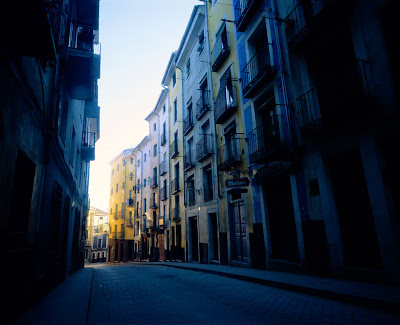
Cuenca, Spain
WE: Your photographs are incredible. Please tell us more!
EG: Thank you, I work hard for those photographs, and it’s more perseverence and planning than skill. I work with a large format film camera. The film comes in sheets, and it costs me five dollars for every shot I take. That seems strange to a lot of people in the digital age; but it works for me; in their words, my camera is 500 megapixels and entirely mechanical, so that I can shoot in extreme weather conditions and never worry about parts failing, batteries giving out, that sort of thing. I usually focus on one shot a day while I’m on the road. It may consume six to ten hours of my day. The quality of landscapes are based on the quality of the moment, the light, the weather and so, I may spend an entire day planning for a single shot, but if the weather clouds over or the wildflowers close up or a furious rain strikes, it’s lights out for that day’s photograph.
Landscape photographs can set a tone, can create an emotion and a mood. They can haunt and inspire us. And I think that we landscape photographers haven’t even begun to touch the surface of where we can take this out-of-favor art form. There are mangroves we haven’t yet wandered through, and there are mud-caked flats that are beautiful and desolate and, if photographed correctly, could make us feel lonely and inspired at the same time.
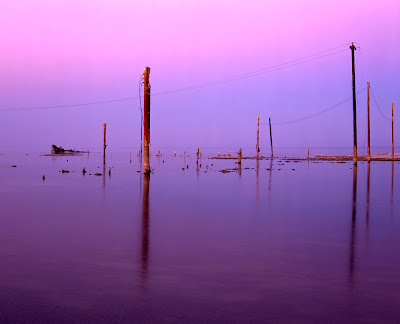
Salton Sea, California
WE: What role does history play in your travels, site, writings? Every time I read another essay on your site, I learn so much.
EG: I am a futurist. I love the future. I think that if we can agree to a secular definition of why we are here on Earth, we can say it’s that we are here to make our community, our countries and our planet a better place than how it was when we came into it. That we are here to advance human culture – to build a world of more books, more knowledge, more brilliant gardens and museums, more freedom, more laughing and love, and so forth.
Travel is like a bridge between history and the future. Whenever we travel, we see both side by side. They illuminate each other.
History is everywhere. When Americans visit Europe to see culture and history in museums and old churches, they’re kidding themselves. History is everywhere, and it’s directly tied to everything that is happening now and everything that will happen in the future.
People will travel to Europe and learn the history of say, Napoleon, or the history of a church. This is great, these are the big stories of history in the Western Hemisphere. But there are smaller histories too, and I really like those. I like to learn about pieces of history that nobody else has learned. And often-times, piecing together these smaller histories gives you a unique glimpse at the big events too. If I dive into the history of Great Guana Cay, I dive into a tiny history that tells a side-story to bigger histories – because even Great Guana Cay’s history can tell me about the American Revolution, slavery, the history of environmentalism in North America, the commerce and piracy of the 1700’s, the slave trade, rum and cotton, England and France and Spain and so on.
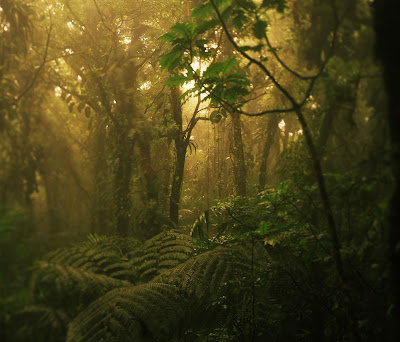
Mombacho, Nicaragua
WE: Thanks so much, Erik. I've immensely enjoyed hearing the backstory of your site and work. notes from the road is inspiring, and can change the way we travel and interact with each other. Thank you!
To explore Erik's site, please see: http://www.notesfromtheroad.com
All photos courtesy and copyright of Erik Gauger.
-

- Log in to post comments


















